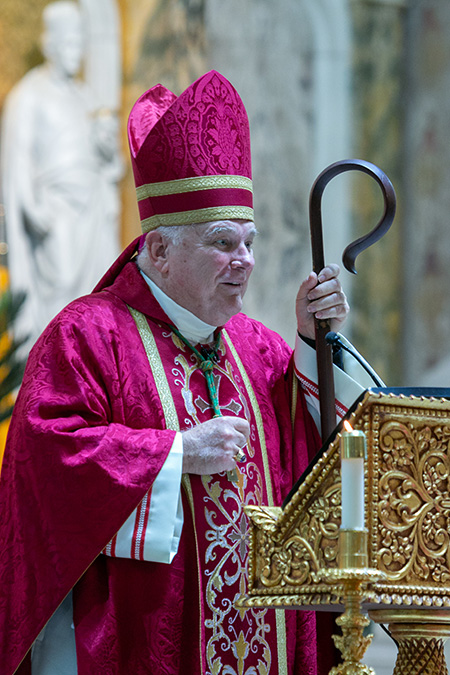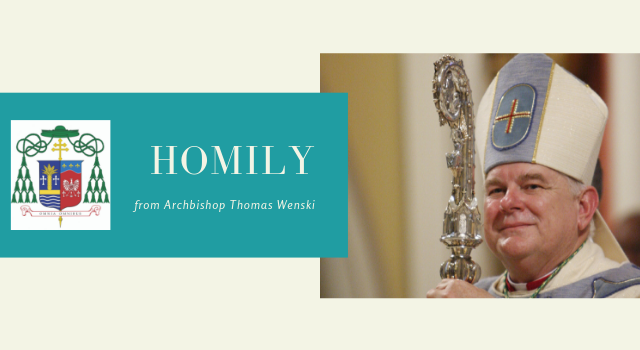By Archbishop Thomas Wenski - The Archdiocese of Miami
Archbishop Thomas Wenski preached this homily at the annual Red Mass for those in the legal profession, celebrated Oct. 29, 2020, at Gesu Church in Miami. The Mass is organized by the Miami Catholic Lawyers Guild and this year was sponsored by St. Thomas University in Miami Gardens.
With Amy Coney Barrett sworn in as a Supreme Court Justice earlier this week, SCOTUS – the Supreme Court of the United States – has six Catholic justices; Justice Gorsuch would make seven but while he was raised as a Catholic, he is said to attend an Episcopalian Church.
Of course, some of these “Catholic” justices have been criticized for not being Catholic enough.
But I always say that every baptized Catholic can call himself or herself a “practicing Catholic” because this life is our one chance to practice the faith until we get it right.
And, if some have been criticized for not being “Catholic” enough, in the last month, some in the media have criticized Justice Barrett as being too Catholic.
Of course, we should all strive to be not just a good Catholic but a great Catholic. Like a “good lawyer” knows the law, a “good Catholic” knows the catechism. And like a “great lawyer” knows the judge, a “great Catholic” knows the Judge of heaven and earth, Jesus Christ.

Photographer: ANA RODRIGUEZ-SOTO | FC
Archbishop Thomas Wenski preaches the homily during the annual Red Mass, celebrated Oct. 29, 2020. The Mass is hosted by the Miami Catholic Lawyers Guild, which presented its annual Lex Christi, Lex Amoris award to Catholic Legal Services of the Archdiocese of Miami.
The Irish novelist, James Joyce, once described the Catholic Church as “here comes everybody” – he didn’t mean it as a compliment. But the Church does welcome everybody – saint and sinner, rich and poor, the learned and the unlettered.
Today, of course, today we see much anger in our society. And much of that anger seen in our streets and expressed in social media really revolves around the argument over “who belongs.” And so, we hear warring slogans: “Black lives matter,” “Blue lives matter,” “All lives matter,” and from those who identify as prolife, “Unborn lives matter,” And they all do matter – but beneath these slogans there is an argument about “Who truly belongs to our society?” And, “who is shut out?”
A sense of belonging – of being attached to particular people and places – gives shape to our identity and provides security in which to grow. As human beings we long to belong – to a family, to a community, and to a nation.
With the appointment of Amy Coney Barrett two thirds of the Court identify as Catholics – even though Catholics make up just a little more than 20% of the U.S. population. We are also overrepresented on Capitol Hill with 31% of Congress identifying as Catholics. Considering that for much of our nation’s history Catholics were looked on with suspicion as being “un-American,” this is quite an achievement – one that perhaps shows that we’ve come into our own and fully belong to the American polity. This is also shown in the numbers of Catholics in law enforcement and the legal profession. Perhaps, this happened – given the prejudice we faced – as a way of assuring our religious freedom.
Perhaps Catholicism today is a natural bridge between the founding principles of our nation and the principles of Catholic social teaching with its understanding of natural law. This is not without its importance today as the division in America today is not between Catholics and Protestants but a religious and secular divide, with one side, the secularists, holding for a radical autonomy by which truth is determined not by the nature of things but by one’s own will and the religious side – our side – holding that men and women are not self-creators but creatures, that truth is not constructed, but received, and that it must reflect the reality of things.
Catholic teaching proclaims the dignity of every human being but also acknowledges the reality of sin. Our police forces, our social services agencies, our schools, our courtrooms deal with the consequences of sin every day. Our founders also recognized human sinfulness, which is why they gave us a divided government based on checks and balances.
Our nation’s founders built better than they knew – and better than we appreciate today. Their vision of freedom was one of ordered liberties, a vision remarkably congruent with Catholic social thought. St. Thomas Aquinas – the great theologian of the 13th century – would have been very comfortable in the presence of Jefferson, Adams and Monroe. And they, I am sure, would be more comfortable in his presence than in the presence of any number of Harvard-educated constitutional lawyers today.
And so as Catholics but also as members of the Bar, you can make an important contribution to the argument that lies beneath the social unrest the besets our society today as it faces the challenges of enduring racism, growing inequality and the intolerance of a “cancel culture.” Without your contribution and commitment to both Catholic social teaching and our founders’ vision of freedom as “ordered liberties,” our system of justice would devolve to a type of judicial positivism based simply on a common agreement to set aside truth claims about the good –“We hold these truths...” – and to adopt a relativism which would make the practice of law the province of irrational tastes and arbitrary subjective judgments
When a democracy bases itself on moral relativism and when it considers every ethical principle or value to be negotiable (including every human being's fundamental right to life), it is already, despite its formal rules, on its way to totalitarianism. The might of right quickly becomes might makes right.
Your craft as lawyers and as officers of the court has as its foundation, its reason for being, the principle emblazoned on the façade of the Supreme Court building, “Equal justice under the law.” Equal justice makes possible that belonging – e pluribus unum – in which we as Americans find our identity and the security that enables human flourishing in this land of the brave and the home of the free.

